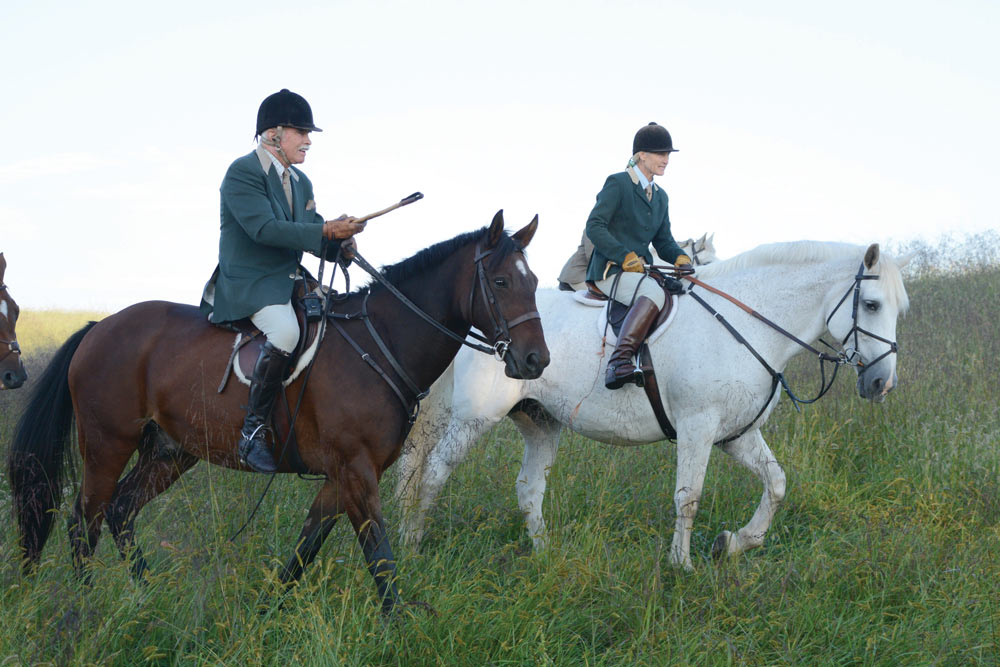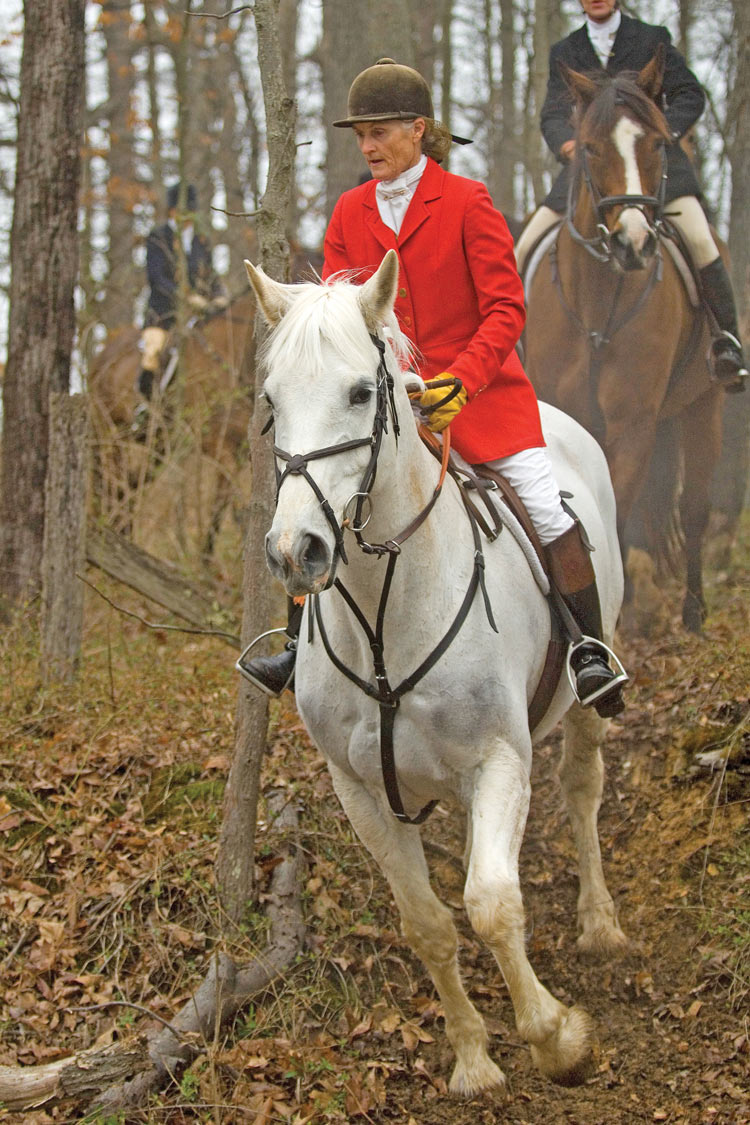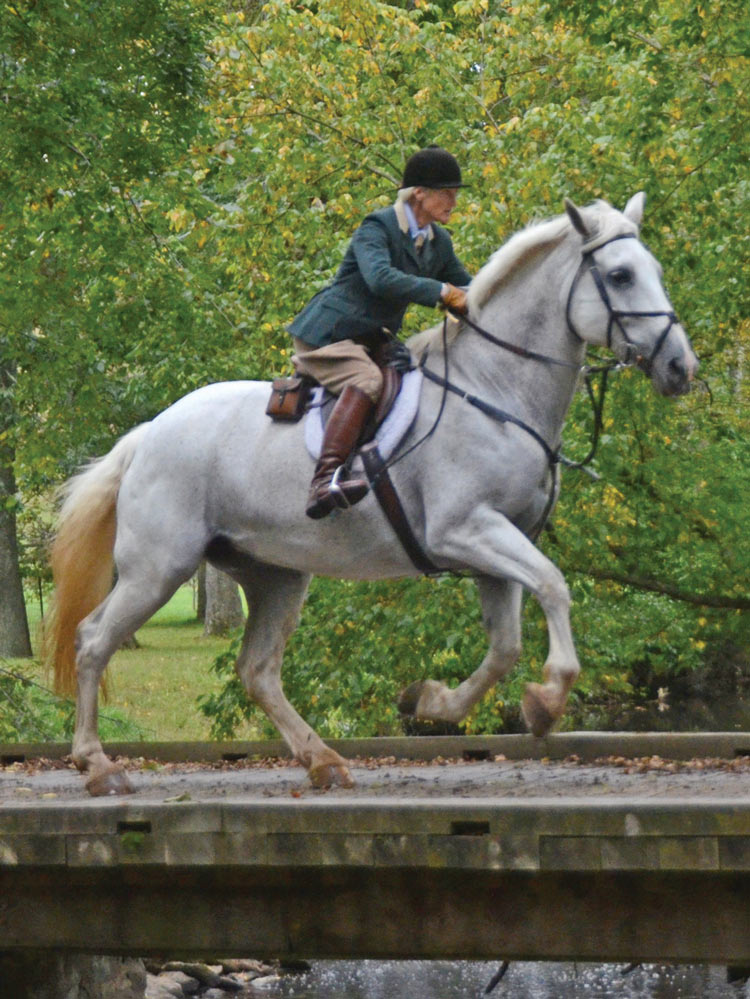Horses, horse sports & equestrian tradition

By Mark Deane
Middleburg, recognized as the heart of Virginia’s hunt country, is a town blessed with an abundance of gifts. Steeped in history, charm and old-fashioned Southern hospitality, the town nestles into a picture-perfect countryside.The rolling land is home to beautiful farms, fertile vineyards and grand old estates, framed against a breathtaking background of the Blue Ridge and Bull Run mountains.
Having been fortunate to reside in this special area for nearly 50 years, I have come to realize that, among all these riches, Middleburg’s greatest treasure is the town’s residents. Our town has always been called “home” by a diverse and fascinating group of individuals, people who cross social and economic backgrounds to share a common love of our unique country lifestyle.
One such resident is Maryalice Matheson-Thomas, an accomplished horsewoman. Soft-spoken and often found quietly working behind the scenes in Middleburg’s equestrian community, Matheson-Thomas is passionate about the town, particularly about the horses and the equestrian lifestyle that play such an important role in Middleburg’s identity. She is dedicated to introducing newcomers to horses and horse sports and to passing on and preserving equestrian traditions.
Originally from Massachusetts, Matheson-Thomas first visited Middleburg with her parents over 30 years ago. To Matheson-Thomas, who was enamored with horses and all things equestrian at a young age, the town seemed like heaven on earth.
She vividly recalls glancing through a local phone book during that trip and finding the name of her then-idol, the famous show jumper Rodney Jenkins, among the listings. It was a moment that made a lasting impression on Matheson-Thomas, who believed that, to become a knowledgeable horsewoman, she needed to learn from the best in the business.
Although Middleburg stole her heart during that first visit, it would be some time before Matheson-Thomas settled in the town. In the interim, she pursued her goal of equestrian education, her quest taking her as far as Austria to study. “I learned a lot about carriage horses and dressage while I was in Austria,” Matheson-Thomas recalled, and that knowledge would prove vital to her future business in Middleburg.
Upon her return to Massachusetts from Europe, Matheson-Thomas enrolled in a written course of equestrian study developed by a Virginia horsewoman. “Before I finished the course, I contacted the author and made arrangements to work on her farm,” Matheon-Thomas said. “I bought a one-way bus ticket and headed to Virginia.”
The bus route took Matheson-Thomas back through her favorite town, Middleburg, where the bus made a brief rest stop. “I will never forget getting off the bus at that stop in Middleburg,” Matheson-Thomas recalled. “The first person I saw as I stepped off the bus happened to be the most elegant horseman I had ever seen.” When Matheson-Thomas described the gentleman to me — an older, distinguished African-American wearing a trademark black hat — I recognized immediately one of Middleburg’s many interesting residents, Colonel Brooks.

Middleburg felt so much like home to Matheson-Thomas that she was ready to disembark from that bus, suitcase in hand and settle in; that is, until the bus driver reminded the young woman that her ticket was taking her to Middletown, Virginia, not Middleburg. Reluctantly, Matheson-Thomas climbed back aboard and headed to her intended destination for her new job. Middleburg continued to pull at Matheson-Thomas’ heartstrings, however, and it wasn’t very long before Matheson-Thomas returned to Middleburg to make the town her home.
In Middleburg’s vibrant and diverse equestrian community, Matheson-Thomas found her niche in training and driving carriage horses, drawing on the knowledge she acquired during her time studying in Austria. Matheson-Thomas opened her business, Bowler Hill Farm, in the nearby town of Marshall and focused on breaking, training and boarding carriage horses.
Matheson-Thomas explained that training a carriage horse is very labor-intensive: “It can take up to two hours per horse per day to cover all the training necessary to make a successful carriage horse, so usually, I cannot train more than five horses a day.” She noted that the first lessons for a prospective carriage horse systematically desensitize the horse to sudden noises and movements and include teaching the horse to accept wearing blinkers on its eyes, which permit the horse to look only straight ahead.
In Matheson-Thomas’ experience, she can have the average horse driving well in 90 days; however, teaching a new, inexperienced owner to handle his or her new carriage horse or team of carriage horses is often a longer process. “Around the 90-day mark, if I feel a new carriage horse is ready, I will begin to give the new owners their first driving lessons. But I would not allow an owner to drive a horse alone until I am confident that both the horse and the owner are ready.”
Matheson-Thomas believes that driving is a horse sport that is “friendly” to beginners, because it is not as physically demanding on a person to learn to drive as it is to learn to ride. “You really don’t have to be physically fit to drive a horse,” Matheson-Thomas noted. In addition, entry-level carriage driving can be a surprisingly budget-friendly horse sport, since equipment costs as well as the price for a serviceable driving horse can be quite low.
In Middleburg’s vibrant and diverse equestrian community, Matheson-Thomas found her niche in training and driving carriage horses, drawing on the knowledge she acquired during her time studying in Austria.
For those who might be interested in the sport of driving, Matheson-Thomas recommended contacting the Piedmont Driving Club (piedmontdrivingclubva.com), a group of driving enthusiasts to which Matheson-Thomas belongs. The club has about 75 members who meet each weekend in different area locations. Matheson-Thomas notes that club members are always enthusiastic about helping newcomers to their sport, and attending a club meeting is a wonderful introduction to carriage driving.

Matheson-Thomas’ passion for introducing people to the traditions, challenges and joys of Middleburg’s equestrian life extends beyond carriage horses and driving. A member of the Orange County Hunt for the past 30 years, she currently serves as the foxhunt’s second flight hunt master. In this capacity, she leads a group of people, including newcomers to foxhunting as well as more experienced hunters, on a slower, non-jumping route to follow the hounds.
“I look out for the inexperienced foxhunters, and I try to explain to them all the action that is going on during the hunt,” she said. “We try to make these experiences as enjoyable and welcoming as possible for new people who are not familiarwith hunting.”
Matheson-Thomas added, “I encourage people to contact our area’s many different hunts for information about foxhunting, even if they have no experience or no horse. There are many people more than willing to help newcomers participate at some level.”
Matheson-Thomas’ husband, John Dale Thomas, is a lifelong Middleburg resident who shares his wife’s love of horses and horse sports. Thomas grew up on Paul Mellon’s famous Rokeby Stables farm in Upperville, and is a fixture in the community.
Over his career, Thomas worked in a wide variety of jobs in the sport that he loves: exercise rider, steeplechase jockey and trainer, to name just a few. Currently, Thomas is working for a horsemen’s group in an attempt to establish a horse racing circuit in Virginia.
Whether you are a longtime Middleburg resident or a visiting tourist, experiencing the equestrian traditions of Middleburg is easy with people like Maryalice and Dale willing to share their passion and vast knowledge. ML


